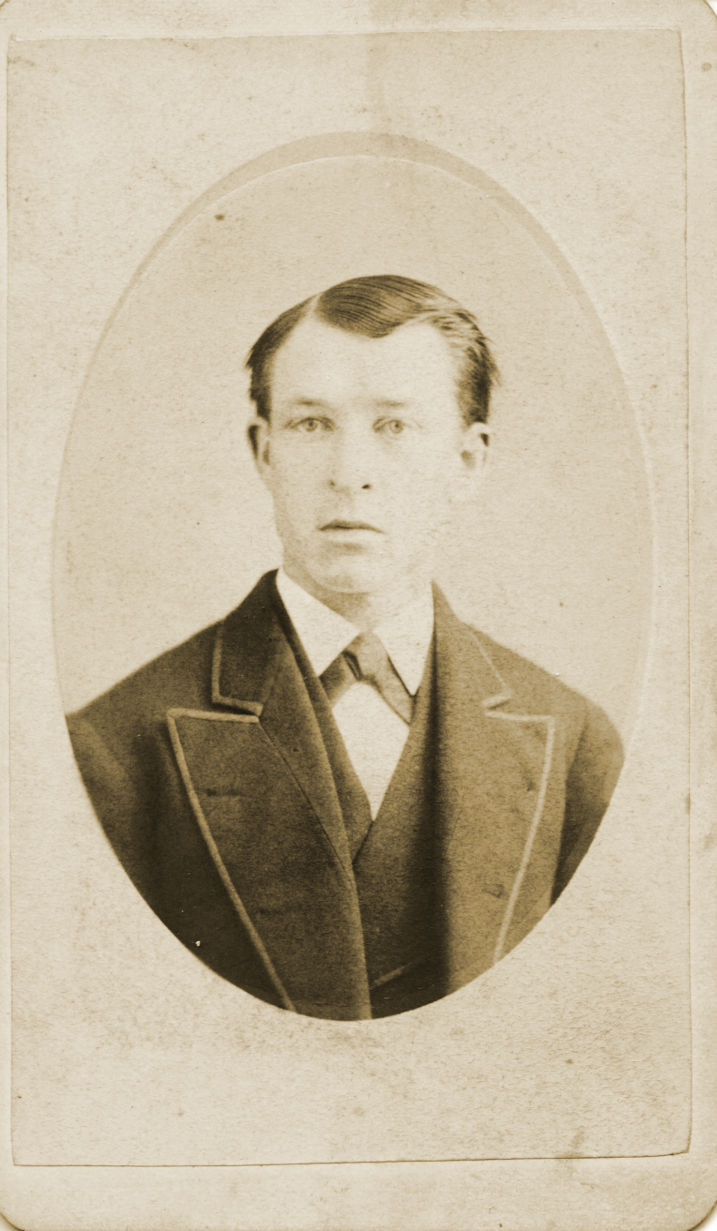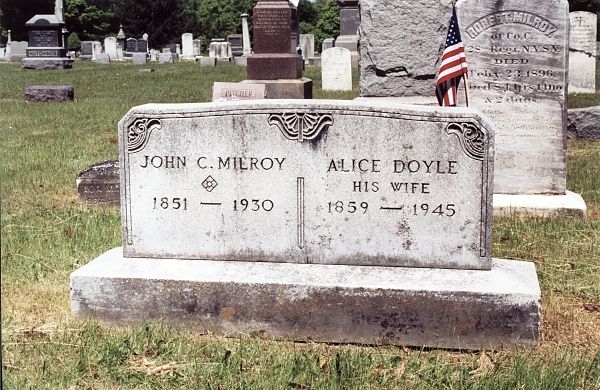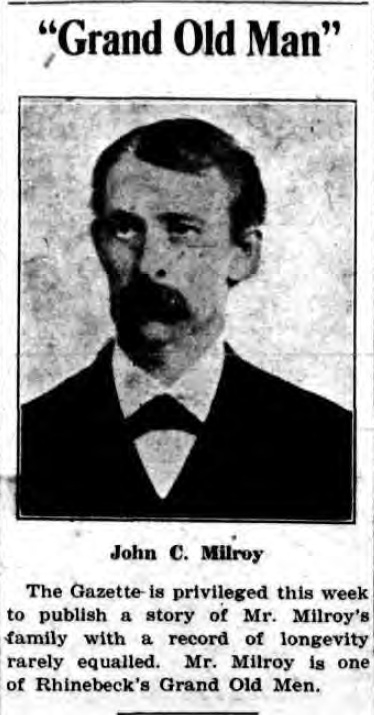I haven't found an obituary for John yet, but I did find a long biographical article about his family's longevity:
================
(Found at www.fultonhistory.com/fulton.html)
The Rhinebeck Gazette
and Red Hook Times
January 12, 1929
front page and page 4
(front page badly damaged along the left edge)
Average Age is 80 in Milroy Family
--------------
Record for Longevity Established by Five Brothers and Sisters Whose Combined Ages Equal 400 -- John C. Milroy Has Had Active Career In Rhinebeck
All records for longevity in a single family appear to be broken by the children of the late Robert J. Milroy. There are five children living today, Mrs. W. R. Friday, eighty-eight, of Ossining, Mrs. John S. Bowman, of Wassaic, eighty-seven, John C. Milroy, seventy-eight, and his twin brother, James Milroy, both of Rhinebeck, and Lafayette Milroy, sixty-nine, of Hyde Park. Their combined ages equal 400, and by dividing it by 5, their average age is 80. This is a record that is hard to equal, not alone in Rhinebeck, but in almost any section of the country.
Through the kindness of John C. Milroy, the brother who is perhaps the best known of any of the children of the Rhinebeck people, The Gazette has been furnished with a photograph which shows five generations of the original Milroy family. This photograph, which was taken in 1909 (sic. - Another earlier newspaper confirms that this photo was actually taken in 1905. - RET), just? two years before the death of Mr? Milroy's mother, shows her, Mrs. Robert J. Milroy (before her marriage, Mary Carmichael) his sister, Mrs. John S. Bowman, Mrs. Bowman's daughter, Mrs. Elma Simmons (with whom Mrs. Bowman now lives in Wassaic), Mrs. Simmons daughter Mrs. Charles Herrick, and her son Harold, then around two years of age, but now a young man, having reached his majority and working in New York City.
Mr. Milroy's father and mother were both born in Scotland and came of hardy stock. Coming to America shortly after 1830 with their parents, they met in Brooklyn and after the usual courtship, were married in 1839 by no less a person than the young rector who was later to be widely known as Bishop Potter.
After their marriage, Mr. and Mrs. Milroy moved to the Town of Milan, where they took up farming. Later the father and two of the older sons, William C. Milroy, who died in Nebraska at the age of seventy, and Alexander, whose death occurred at San Juan, California, when he was thirty-four, enlisted in the Civil War. At the time he volunteered, the father was forty-nine, considerably older, in fact, than most of the men in the Union Army, and he served in Company C of the celebrated 128th Regiment, seeing plenty of action. On account of his father being so old when he volunteered, John Milroy, his son, has pointed out the fact that he and his twin brother now enjoy the unusual distinction in being the seventy-eight-year-old sons of a Civil War veteran -- a fact that is run across but rarely amid the G. A. R. rallies?
Upon his return North after the war, the father moved his family (to?) Rhinebeck and resumed his old trade of tailoring in the local establishment of Brooks. John C. Milroy was then a boy of fifteen, and having lived here the remainder of his life, without a single migration to any other locality, he can recall vividly the important changes that the village has undergone and the slow but steady? growth it has enjoyed. To him the many transformations that have taken place are interesting pictures in his memory, illustrating the forward progress of Rhinebeck.
Mr. Milroy is the oldest member of the Odd Fellows Fraternity in Rhinebeck and he has been chaplain of the lodge for fifteen years. His membership dates back fifty-two years and it was not many months ago when he was presented with his fifty-year jewel; he is also a past grand of the lodge and has represented the lodge several times at the state conclave.
For a man of 78 years, Mr. Milroy enjoys remarkably fine health. He was in a very bad auto accident in July? 1922, and more recently he underwent a serious operation, but his excellent physical condition brought about rapid recovery, although the injuries? he suffered in the accident (would) have resulted in blood poisoning (in) most cases, the doctors assured (him).
His good health Mr. Milroy attributes to two things -- the fact that he has been temperate in his habits, and has been happy in his occupation over? a long period of years.
"(I) never drank any alcohol and I'm proud? of it," he declares, and he is (a) strong believer in work as the cure (for) melancholia and all mental ills. (No) matter how rich a man is, (no) matter how elevated, he isn't happy (unless) he's employed," is Mr. Milroy's sage? counsel to all who seek joy in (life?).
From 1870 until the year of his accident, Mr. Milroy was engaged in (the) blacksmithing business in Rhinebeck. He learned the business from (the) late Philip Gross. For a short (time) he was in partnership with Monroe? Kipp, then when this was dissolved, he carried on in the business ???? till 1886? when his brother, Lafayette, associated himself with him, (the) partnership continuing till 1919. Although his shop was then turned into a garage? and repair shop for (cars?), Mr. Milroy still visits the place (today?) to do a little work and occupy (his time?).
Mr. Milroy has taken an active part in public affairs. For twenty-two years, though not consecutively, he was a trustee of the village; he also was a member of the board of education of this district several years ago, and for four terms -- in 1886, 1887, 1890 and 1891 -- he was elected town supervisor of Rhinebeck. During his first year in the latter office the town highway department purchased its first stone crusher, for Mr. Milroy was a strong advocate of good roads for Rhinebeck.
One of Mr. Milroy's most important claims to distinction is the fact that he is one of the oldest fireman in the village. Becoming a member of the Pocahontas Hand Engine Company in 1870 and filling, in succession, each office in the company, he took part in many of the hand engine contests which were featured at firemen's conventions and tournaments in former days and in which "Old Poca" as the local engine was familiarly called, seldom failed to give a good account of itself. A wistful light creeps into Mr. Milroy's eye as he recalls these by gone experiences in which he took so active a part and as he recalls one victory after another, he grows enthusiastic over his memories.
In 1880 Mr. Milroy married Miss Alice Doyle and to them were born three children, Robert J. Milroy, Anna, the wife of Wallace Lown, and Francis, now dead. He now has eight grandchildren.
ADVERTISEMENT
BY
Looking for more information?

 Roxy Triebel
Roxy Triebel 
 Roxy Triebel
Roxy Triebel 
 Roxy Triebel
Roxy Triebel 